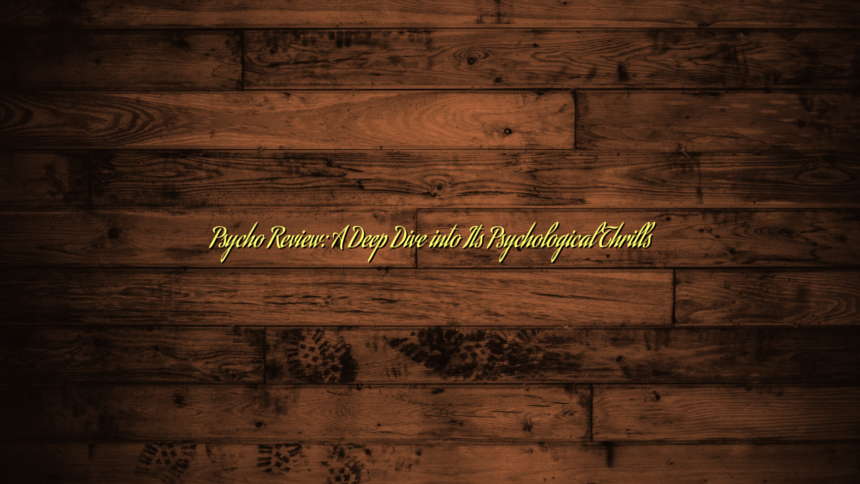Psycho Review
When Alfred Hitchcock’s Psycho was launched in 1960, it modified the panorama of horror cinema ceaselessly. Even over six a long time later, it stays a high-water mark for psychological thrillers, influencing numerous filmmakers and charming audiences with its groundbreaking narrative strategies and chilling character research. On this Psycho evaluation, we are going to study the movie’s psychological components, its cultural influence, and what makes it a timeless masterpiece on the earth of cinema.
The Plot: An Overview
At its core, Psycho presents a seemingly easy story of a younger lady, Marion Crane (performed by Janet Leigh), who decides to steal a big sum of cash and go on the run. Her journey takes her to the eerie Bates Motel, the place she encounters the enigmatic Norman Bates (Anthony Perkins). Their unsettling interplay spirals right into a collection of stunning occasions, culminating in probably the most well-known twists in movie historical past. The nuanced layers of the plot function an ideal canvas for exploring deeper psychological themes.
Psychological Themes Explored in Psycho
Duality of Human Nature
Central to any Psycho evaluation is the theme of duality—embodied within the character of Norman Bates. His cut up persona raises profound questions on identification and morality. On one hand, there’s the seemingly innocent Norman, who’s shy and awkward; then again, there lurks the sinister determine of his deceased mom, whose controlling affect manifests in violent tendencies.
Hitchcock masterfully makes use of this duality to discover the darker facets of human nature. It poses a strong query: What lies beneath the floor of our identities? Are all of us able to harboring darkish secrets and techniques? By presenting a personality that embodies such extremes, Psycho provides a psychological puzzle viewers should remedy, drawing them deeper into the narrative.
The Nature of Concern
One other core ingredient of the Psycho expertise is concern. Hitchcock expertly manipulates sound, lighting, and cinematography to create an environment thick with pressure. The notorious bathe scene, accompanied by Bernard Herrmann’s piercing rating, is a masterclass in cinematic suspense. This scene not solely shocks viewers but additionally faucets into primal fears—vulnerability, isolation, and sudden violence.
The psychological thrills of Psycho come from its capability to make audiences confront their very own fears. The movie challenges viewers to contemplate what fears lie beneath their aware consciousness, leaving them in a lingering state of apprehension lengthy after viewing.
Morality and Conscience
Psycho additionally explores ethical ambiguity. Marion’s preliminary act of theft attracts sympathy; she is a flawed however relatable character. Because the story unfolds, her try to flee her life spirals right into a nightmarish encounter with Norman. The movie raises questions on morality—is her crime justifiable? What does it imply when survival instincts take over?
This ethical quandary resonates with audiences of all ages, making the movie not only a horror expertise however an exploration of conscience. The uncertainty surrounding proper and unsuitable accentuates the psychological complexity, contributing to the movie’s enduring legacy.
Cinematic Strategies That Improve Psychological Thrills
Enhancing and Pacing
One can’t talk about Psycho with out acknowledging its revolutionary modifying strategies. Suspense is constructed via speedy cuts and surprising pacing. The abrupt transitions, notably in the course of the bathe scene, jolt the viewers, creating an emotional expertise that mirrors Marion’s terror.
This unconventional method to modifying is groundbreaking and has since influenced numerous filmmakers. The speedy cuts not solely increase the shock however create a psychological rhythm that retains viewers on edge, emphasizing the movie’s central themes of concern and confusion.
Symbolism and Imagery
Hitchcock’s use of symbolism is one other essential facet worthy of point out in any detailed Psycho evaluation. The notorious Bates home, perched ominously on a hill, symbolizes Norman’s fractured psyche. Its looming presence all through the movie serves as a relentless reminder of his duality.
Different visible motifs, like shadows, mirrors, and the distinction between gentle and darkish, serve to underscore the themes of inner battle and identification. The interaction of those visible components cultivates a stronger psychological influence, solidifying Psycho as a thriller that operates on a number of ranges.
Psycho’s Cultural Impression
A Trailblazer within the Horror Style
The psychological thrills introduced in Psycho have redefined the horror style. By merging components of suspense, drama, and psychological terror, Hitchcock paved the way in which for future filmmakers to discover advanced character research in horror. Horrifying although it is likely to be, Psycho has at all times been greater than only a mere thriller; it’s a profound exploration of the human psyche.
Hitchcock’s willingness to push boundaries has impressed generations of filmmakers. From Martin Scorsese to David Lynch, many have drawn inspiration from Psycho, demonstrating its lasting influence on cinema.
Affect on City Legends and True Crime
Furthermore, Psycho has had a profound cultural affect past the silver display screen. It has impressed numerous city legends and discussions about true crime, main audiences to look at societal perceptions of sanity and morality. The movie’s tackle a disturbed thoughts has prompted wider dialogue round psychological well being, notably alongside real-life occasions which have paralleled its eerie narrative.
Conclusion: Classes from Psycho
In abstract, Psycho shouldn’t be merely a horror movie—it’s a profound journey into the depths of psychological horror. By means of its exploration of duality, morality, concern, and revolutionary cinematic strategies, the movie continues to resonate with audiences at this time.
For these looking for psychological thrillers that problem perceptions and ignite conversations round human conduct, Psycho stands as a benchmark. Its affect permeates fashionable movie and stays a wealthy topic for evaluation and dialogue.
Takeaways
- Discover Your Personal Fears: Watch Psycho and mirror on the way it engages your deepest fears and anxieties.
- Analyze Character Motivation: Take into account the psychological motivations of each Marion and Norman—what drives their actions?
- Perceive the Impression of Cinematic Strategies: Observe how Hitchcock’s use of modifying and symbolism creates psychological pressure, and take into consideration how one can apply these strategies in your insights or future works.
Whether or not you’re a informal viewer or a budding filmmaker, the teachings and thrills from Psycho stay as related at this time as they had been upon its launch. Participating with this traditional movie not solely gives leisure but additionally serves as a compelling exploration of the complexity of human nature.





